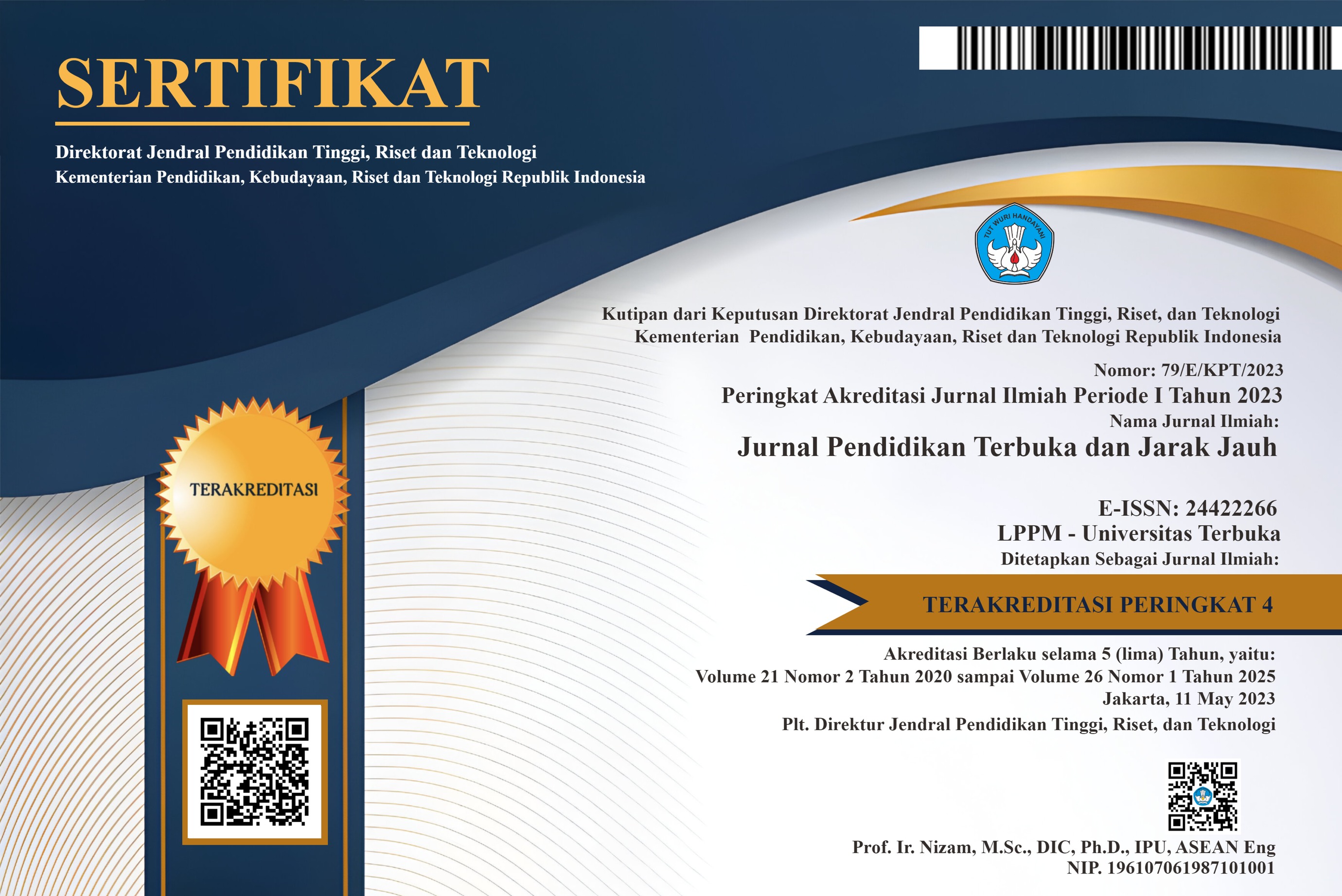STUDI JANGKA PANJANG TENTANG EFEKTIVITAS INTERVENSI PSIKOLOGIS DALAM MENINGKATKAN KEMAMPUAN BELAJAR MANDIRI DAN PRESTASI BELAJAR MAHASISWA PENDIDIKAN JARAK JAUH
Keywords:
achievement, distance education, intervention, modeling, self-directed learning, self-regulated learningAbstract
This research was conducted to trace the long effects of psychological interventions, which were provided in the previous research in 2004. The psychological interventions were given to the distance learners of Universitas Terbuka (UT) in the previous research experiments in 2004. The psychological treatments had been aimed to enhance self-directed learning abilities to the first year students of Public Administration Study Program of UT, who registered in 2004.The respondents had randomly assigned into three experimental groups and one control group. The learners achievement had been followed to the first semester of 2007 and 2008. Learnersachievement was measured through regular course examinations. The three experimental groups were tested against the control group. The hypothesis was tested using analysis of Variances (ANOVA). The results show that after a 3 to 4 yeras there was a significant difference in students achievement between the experimental groups and the control group (p = 0.027). In summary, this research proves that psychological interventions that are usually used in face-to-face education could effectively be used in distance education context as well. As the findings show that, after a period of time, the interventions significantly increase students awareness of the need to learn that leads to the increase in their self-directed learning abilities and their achievement.
References
Bagnall, R. G. (1989). Educational distance from the perspective of self-direction: An analysis. Open Learning, 4 (1), 21-26.
Belawati, T. (1995). Increasing persistence in Indonesian post-secondary distance education. Disertasi yang tidak dipublikasikan, University of British Columbia, Vancouver, BC.
Belawati, T. (1997). Understanding and increasing student persistence in distance education: A case of Indonesia. Jurnal Studi Indonesia, 7 (1), 29-46.
Candy, P. C. (1991). Self-direction for lifelong learning: A comprehensive guide to theory and practice. San Francisco: Jossey-Bass Publishers.
Christensen, L. B. (2001). Experimental Methodology (8th ed). Boston: Allyn & Bacon.
Darmayanti, T. (1993). Readiness for self-directed learning and achievement of the students of Universitas Terbuka (The Indonesian Open Learning University). Tesis master yang tidak dipublikasikan, University of Victoria, Victoria, BC.
Darmayanti, T. (2005). Efektivitas intervensi keterampilan self-regulated learning dan keteladanan dalam meningkatkan kemampuan belajar mandiri dan prestasi belajar mahasiswa pendidikan jarak jauh. Disertasi yang tidak dipublikasikan, Jakarta: Universitas Indonesia.
Faisal, S. (1989). Format-format penelitian sosial. Jakarta: PT RajaGrafindo Persada.
Grow, G. O. (1991). Teaching learners to be self-directed. Adult Education Quarterly, 41 (3), 125-149.
Hofer, B. K., Yu, S. L., & Pintrich, P. R. (1998). Teaching college students to be self-regulated learners. Dalam D. H. Schunk., & Zimmerman, B. J. (Eds.). Self-regulated learning: From teaching to self-reflective practice. New York: The Guilford Press.
Huitt, W. (1999). Conation as an important factor of mind. Diambil pada 30 Maret 2001, dari http://chiron.valdosta.edu/whuitt/col/regsys/conation.html.
Islam, S. (2000). Prestasi belajar, kesiapan belajar mandiri dan konsep diri mahasiswa pada sistem pendidikan terbuka dan jarak jauh: Suatu studi korelasional di Universitas Terbuka (1997). Tesis yang tidak dipublikasikan. Jakarta: Program Pascasarjana Universitas Negeri Jakarta.
Keegan, D. (1990). Foundations of distance education (2nd ed). London: Routledge.
Kerlinger, F. N., & Lee, H. B. (2000). Foundations of behavioral research (4th ed). Singapore: Thomson Learning, Inc.
Knowles, M. S. (1975). Self-directed learning: A guide for learners and teachers. Chicago: Follett Publishing Company.
Liebert, R. M., & Liebert, L. L. (1995). Science and behavior: An introduction to methods of psychological research (4th ed.). New Jersey: Prentice-Hall, Inc.
Long, H. B. (1991). College students self-directed learning readiness and educational achievement. In H. B. Long., & Associates. Self-directed learning: Emerging theory & practice. Oklahoma: Oklahoma Research Center for Continuing Professional and Higher Education of the University of Oklahoma.
Moore, M. G., & Kearsley, G. (1996). Distance education: A systems view. Belmont, Calilfornia: Wadsworth Publishing Company.
Pintrich, P. R., & De Groot, E. V. (1990). Motivational and self-regulated learning components of classroom academic performance. Journal of Educational Psychology, 82 (1), 33-40.
Putra, A. A. M. S. (1993). Student persistence at and drop-out from Universitas Terbuka (The Open University of Indonesia). Tesis master yang tidak dipublikasikan, University of Victoria, Victoria, B. C., Canada.
Simpson, O. (2000). Supporting students in open and distance learning. London: Kogan Page.
Sugilar. (2000). Kesiapan belajar mandiri peserta pendidikan jarak jauh. Jurnal Pendidikan Terbuka dan Jarak Jauh, 1 (2), 1-13.
Sukadji,. (2000). Menyusun dan mengevaluasi laporan penelitian. Jakarta: Penerbit Universitas Indonesia (UI-Press).
Sukirman. (1997). Intelegensi, kemandirian, kebiasaan belajar dan prestasi belajar mahasiswa D2PGSD IKIP Semarang. Tesis yang tidak dipublikasikan. Jakarta: Universitas Indonesia, Fakultas Psikologi.
UT 1998 Catalog
UT 2004 Statistik
Vermunt, J. D. (1998). The regulation of constructive learning processes. British Journal of Educational Psychology, 68, 149-171.
Wong, D. F. K., & Kwok, S. L. Y. C. (1997). Difficulties and patterns of social support of mature college students in Hongkong: Implications for student guidance and counselling services. British Journal of Guidance and Counselling, 25 (3), 377-387.
Wright, T. (1989, September). Tutorials as a context for developing independence through interaction. Makalah yang dipresentasikan di the Conference of the International Council for Distance Education and the British Open University Regional Academic Services, Cambridge, England. (h. 257-263).
Zimmerman. (1998). Developing self-fulfilling cycles of academic regulation: An analysis of examplary instructional models. Dalam Schunk, D. H. & Zimmerman, B. J. (Eds.). Self-regulated learning: From teaching to self-reflective practice. New York: The Guilford Press





